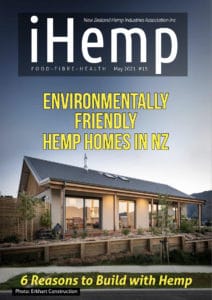Article: Dr Nick Marsh
NZ is a small country which is renowned for its food and beverage exports- in short, we are a world leader in growing and exporting food.
But our Food economy is battered by the closing of the borders and the resultant loss of tourist (and student) revenues. Tourism accommodation, hospitality, and events/attractions are dependent for the foreseeable future on the smaller domestic market tourism.
We therefore need to urgently expand existing food crops and develop new crops which bring capital investment into the regions- and thus jobs- to help replace the loss of international revenues and jobs.
Can Hemp be the Answer?
The Industrial Hemp leaders in New Zealand have attracted the investment to develop a a local hemp industry and to build market demand for a wide range of food and other products. There is substantial interest from investors to add the capital required into the industry to achieve rapid growth and scale for export marketing.
We now need the entrepreneurial vision and determination, backed by our national economic agencies as well as investment funders, to grasp the opportunity to put us in premium position in global hemp markets and drive export growth.
Industrial Hemp has for decades been confused with Marijuana and designated as a narcotic under the American sponsored ‘War on Drugs’. Prior to this law change Hemp was a staple industrial crop in the USA and Europe because the motive power for sailing ships was hemp fibre for rigging, ropes and canvas sails. China and the EU countries which did not embrace the American drug policies have a continuous Hemp history of 2000+ years.
Even our Nation would not exist without Hemp – Captain Cook’s voyage to New Zealand depended on Hemp fibre grown in the UK. – Nick Marsh
Let’s Get clear on Hemp versus Marijuana
In recent years Hemp has been legalised across North America and the majority of OECD countries and is undergoing an investment and consumer market boom around the world. Unfortunately, there is a still a public confusion about hemp and marijuana in New Zealand. In simple terms Marijuana contains THC which can make you high, whilst Hemp contains CBD which can make you well.
The Hemp Marketplace
There are three Hemp product categories- Food (from seed), Fibre (from stalks) , and Nutraceuticals (from cannabinoid extracts). Our ten New Zealand Hemp companies have achieved remarkable progress since 2017 in building a Food (Seed) market with a range of supplement, oil, and balm products both for domestic and export markets, and also a fledgling Fibre industry.
Much of the growth of consumer demand for hemp products is driven by the discovery of the many health benefits of cannabinoids which can be extracted from the flowers and leaves of Hemp – in particular CBD (Cannabidiol). Demand for access to CBD has rocketed in recent years. CBD is a pain killer as well as helping to relieve stress conditions like PTSD, and anxiety conditions. It offers a safe alternative to the Opioids prescribed by doctors. It is a part of the formulations of many of the cannabis medicines currently being tested around the world.
The biggest market is for CBD nutraceutical products such as oils, and balms, as well as an ingredient in a wide range of food and beverage products. This market is estimated to total US$`1.2 billion in the USA of which 75% is CBD.
What’s the Block?
The Hemp regulations amendments in 2018 for New Zealand prohibit processing any of the plant except the hulled seeds, and the Fibre from the stalk. This removes us from the biggest market in the world which is Cannabinoid nutraceuticals which in the USA is 75% of the total hemp market. This is in stark contrast to the US Farm Bill 2018 which allows processing of the whole plant which includes access to all the cannabinoids, flavonoids and terpenes from the flowers and leaves.
Scenario 1 and Scenario 2
Research indicates two scenarios for the growth of the New Zealand hemp economy to 2030. – Nick Marsh
The American states are way ahead of us in seizing the opportunity for growth arising from Hemp legalisation – not just in Seed, and Fibre but also in Nutraceuticals. The US hemp story demonstrates how it takes political leadership to change the prospects for hemp for the benefit of the local community which has been lacking in New Zealand in recent years.
In the US the Senate Majority Leader and Kentucky senator Mitch McConnell, led the support for the Farm Bill 2018. As a direct result Kentucky, which has a similar population to New Zealand, has in 2019 43 processors, gross product sales of US$194 million, capital invested of US$207 million and 1,304 jobs. The vast majority of this growth came from growing , processing and manufacturing CBD.
Just Needs the Nod…..Cut the Red tape and the Industry can achieve Scenario 2
If government wishes to support the rapid growth of revenue and regional jobs from Hemp, then the next Prime Minister needs to cut through the red tape and finesse the Hemp amendment regulations. The driver is the economic crisis faced by our economy
NUTRACEUTICALS – Align with the USA Hemp Nutraceutical Product Market
Remove restrictions on Industrial hemp processing – – it should be treated in the same way as the vast majority of other plants containing low risk bioactive molecules. By definition, industrial hemp contains very low levels of THC and presents no more risk than similar crops such as hops. Following the lead taken by the 2018 US Farm Bill we should not be controlled as a prohibited botanica; allowing us to process all parts of the plant, including the flowers, leaves and roots. Whole plant utilisation is safe and makes economic sense
FIBRE- Mandate low or positive environmental impact materials for construction
Instead of allowing the major construction companies to find the cheapest ways of using its post-Covid-19 investments (with substantial imports), the NZ Government could mandate the use of low or positive environmental impact materials such as hemp. This should stretch to all procurement and public spending on construction, helping to build local supply chains of sustainable construction materials that provide cheaper and healthier homes for our people
AUSTRALIA
Align policy with forthcoming Australia for Therapeutic Goods Regulations changes allowing ‘over the counter’ nutraceuticals containing CBD manufacture and sales. Voter pressure has encouraged the Australian Senate to recently review the performance of the Medicinal Cannabis regulations including the prohibition of CBD products without a prescription. The Ministry of Health is very likely in 2020 to make CBD products with less than 60mg of CBD to be an over the counter nutraceutical product which will open up the CBD market in Australia
For More Information here are some links.
Source:
https://www.scoop.co.nz/ 



